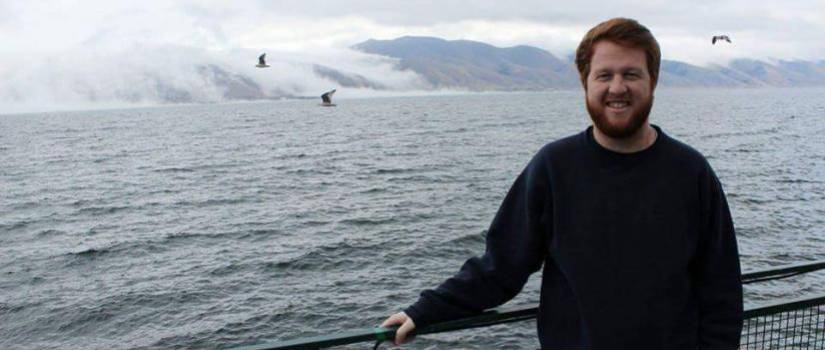Student Travels to Alaska to Answer Critical Questions about Climate Change
Drake McCrimmon, first-year M.S. student in geological sciences, has long been interested in ice, specifically glacial ice. For McCrimmon, ice stands at the center of many questions regarding climate change, and in August he has the opportunity to travel to Alaska to engage with this substance at its source. During this trip, McCrimmon and his advisor, Lori Ziolkowski, will be gathering ice samples at Gulkana and Mendenhall Glaciers in order to collect samples to understand what is making the ice darker. “These dark impurities are important because they are causing glaciers to melt more rapidly,” McCrimmon says, “and the impurities are becoming more abundant. We want to know why—why the impurities are there, why they populate the glacier, and possibly how to remedy.”
The “dark impurities” of interest to McCrimmon are caused by the presence a number of inorganic materials, including dust, soot, and soil particles. What might come as a surprise to many, however, is that microbes live on these inorganic materials. When microbial communities populate glaciers, they create noticeable discoloration and dark holes in the surface, thus hastening the melting process. Scientists have not yet determined what kind of microbes are present on these glaciers, which is where McCrimmon and Ziolkowski come in. “The work we are doing represents a small piece of the overall puzzle that is climate change,” McCrimmon says. “Our central questions are this: What kind of microbes are present? Algae? Bacteria? And what kind of carbon are they eating?”
After collecting samples in Alaska, McCrimmon will devote several months in the lab trying to answer these questions. If, through an analysis of microbial membranes, he finds that the ice-dwelling microbes are consuming carbon produced by fossil fuels, then he might be able to deduce that atmospheric pollution plays a key role in the continual growth of these dark impurities. Since no one has done this kind of research before, McCrimmon’s project could add much to the current conversation on anthropogenic climate change.
After working as an intern in Ziolkowski’s lab in 2014, McCrimmon found out that he wanted to devote his background in chemistry to environmental questions. Rather than do “chemistry for chemistry’s sake,” McCrimmon says, “I learned that I wanted to apply chemistry to environmental systems. During my internship, I discovered that that combination was possible: geochemistry.” McCrimmon volunteered in three labs as an undergraduate, and he encourages students to seek out such experiences before beginning graduate studies. “Exposure is important,” he says. “Professors are always looking for people to help out, and volunteering is always beneficial. Ask your TAs about their research. Don’t be afraid to be uncomfortable.” As a teaching assistant in Geology 335: Processes of Global Environmental Change, McCrimmon regularly communicates this message to his own students.
In October 2015, McCrimmon had the opportunity to travel to Georgia and Armenia to participate in an international workshop on thermophilic microorganisms. During this trip, he and other scientists were able to develop a course of action for scientists in that region who wished collaborate with American scientists. “I'm constantly being surprised by amazing opportunities. Graduate school isn't just about sitting behind a computer or running around in a lab, but it is also about incredible worldly experiences. It is great to understand how American science works, but it was really incredible to see how other parts of the world do it too.”
